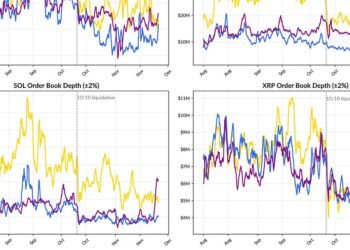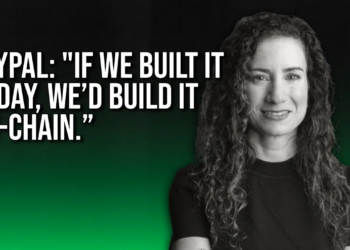Tarek Mansour, Kalshi’s Chief Government Officer, stated on Tuesday that he anticipated it will take a decade for prediction markets to achieve the degrees of inventory buying and selling, nevertheless it’s coming sooner, as Kalshi “created a complete new class of energetic merchants”.
Kalshi CEO Tarek Mansour stated on Tuesday on the Futures Trade Affiliation’s Expo in Chicago that the sector is pushing in direction of a stock-exchange scale a lot ahead of he anticipated.
Mansour views the prediction market area as a “trillion-dollar market.” In line with Bloomberg, Mansour stated he initially anticipated that prediction markets would take a decade to achieve the buying and selling ranges of inventory markets, however the development is going on a lot quicker, as his firm has “created a complete class of energetic merchants.”
Mansour stated extra sports activities partnerships are coming and hinted on the firm’s plans to enter mainstream media, saying he expects “very giant information community partnerships popping out very quickly,” with out offering additional element. “I believe prediction market goes to be embedded very easily, very successfully within the information,” he added.
Mansour’s stance on sports activities betting
Kalshi’s key courtroom win final 12 months opened the door to buying and selling on the US presidential election, sending curiosity hovering. Since then, the corporate and its rivals have leveraged their regulatory standing to enter the sports activities betting market in states the place conventional operators had been restricted or prohibited.
Kalshi presents its event-contract mannequin as distinct from playing, with merchants taking totally different sides of yes-or-no questions reasonably than enjoying towards the home. Regulators have been divided. The Commodity Futures Buying and selling Fee has allowed buying and selling to proceed, whereas a number of state playing regulators have ordered Kalshi to halt, triggering authorized fights that might form the trade’s subsequent stage.
Alongside his firm’s strains, making an attempt to distinguish itself from conventional sports activities betting, Mansour said that Kalshi’s markets are very totally different from playing, arguing that whereas the home at all times wins in playing, prediction markets present a extra even enjoying area.
“I don’t suppose there have been many situations of innovation in monetary markets, particularly in derivatives markets, that haven’t had this bizarre stress with playing,” he added.
Strain, pushback, and new rivals
In the meantime, heavyweight opponents are circling. ICE has agreed to make investments as much as $2 billion in Polymarket, and the CME Group is collaborating with Flutter on a predictions app that ties sports activities and financial indicators. Kalshi is pushing forward regardless, providing contracts via its personal platform and by way of Robinhood, and making ready an aggressive worldwide rollout.
Robinhood CIO sees market dip as a wanted cooldown
Prediction markets are already in mainstream media. In an interview with Bloomberg Information, Stephanie Guild, Robinhood’s Chief Funding Officer, describes the latest fairness slide as a long-overdue correction reasonably than a looming disaster. She instructed Bloomberg Businessweek Day by day that markets often see a pullback yearly or two, however an extended stretch of positive factors distorted expectations. Tech giants poured big sums into artificial-intelligence tasks with out matching money move, she stated, and traders lastly paused to ask when these bets would repay.
Guild pointed to a rising cut up inside the AI sector. Enterprise-focused corporations are beginning to present firmer income, whereas consumer-oriented gamers are nonetheless chasing traction. She additionally cited new full-expensing provisions in US laws, which may spur funding in each superior tech and conventional infrastructure as soon as outcomes start to seem.
Guild stated the market’s rhythm has modified as retail traders achieve affect. They spot alternatives early, commerce concepts on-line, and infrequently keep affected person with smaller, unstable names.
Their conduct has barely budged within the pullback: many trim when costs leap and add once they fall. Consequently, at present’s market reacts much less to a single driver and extra to a mixture of forces, from AI spending cycles to coverage shifts and geopolitics, all pulling on costs without delay.





















